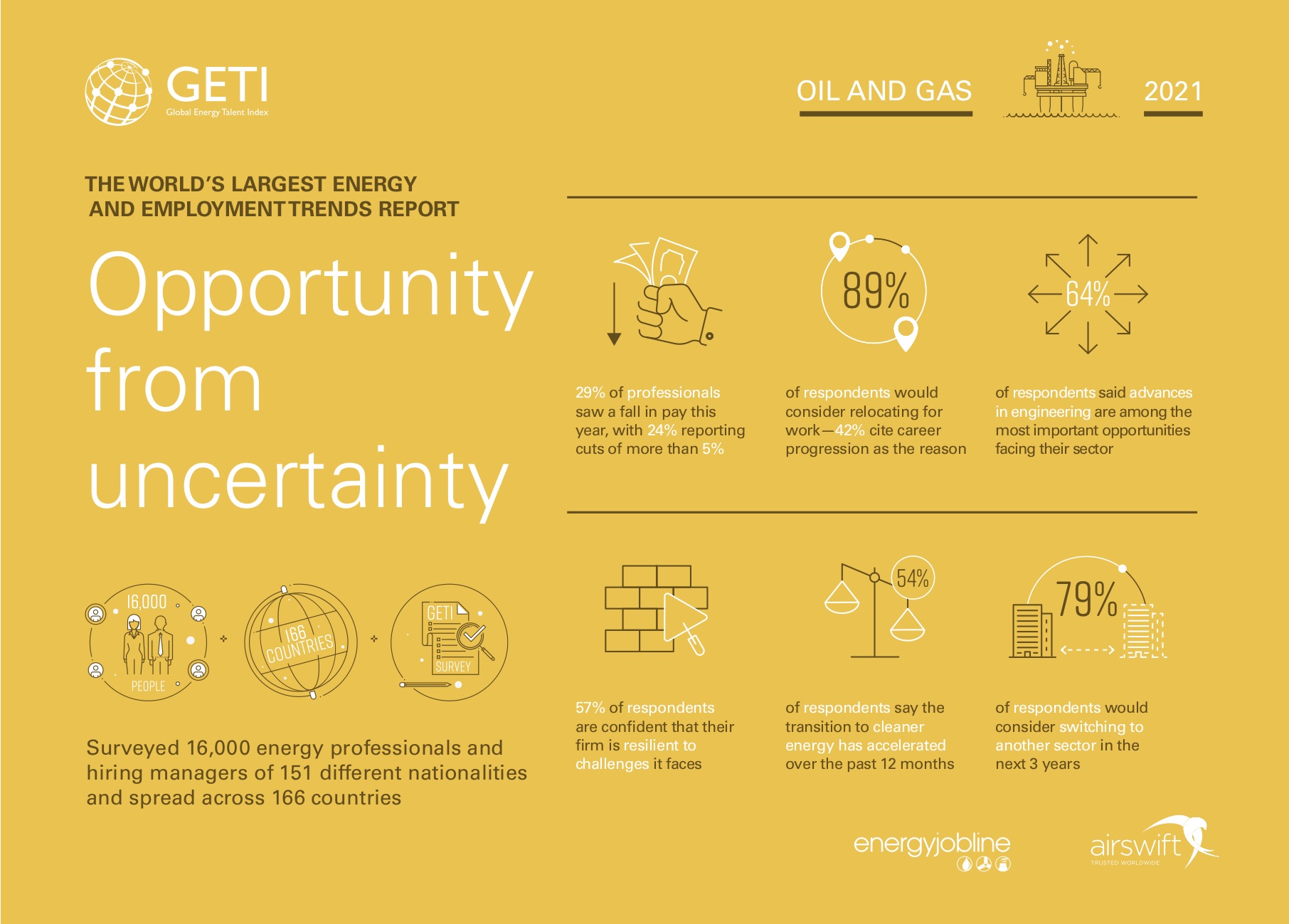
Oil and gas workers are still among the highest paid in the world, but a majority of those questioned said they felt less secure about their jobs than a year ago as investments shift to low-carbon energy sources, according to a Global Energy Talent Index report by staffing firm Airswift and Energy Jobline. (Source: Hart Energy)
Almost one in three workers in the oil and gas industry faced pay cuts in 2020, a worldwide survey showed on Jan. 12, as the coronavirus crisis drove down fuel demand and prices.
Oil and gas workers are still among the highest paid in the world, but a majority of those questioned said they felt less secure about their jobs than a year ago, as the shift to low-carbon energy sources pushed down investment in their industry.
Salaries in the sector are closely tied to oil prices, which plummeted last year as lockdowns slashed demand for fuel.
About 30% of professionals saw a fall in pay last year and one in four said their salaries and day rates fell by more than 5%, according to a Global Energy Talent Index (GETI) report by staffing firm Airswift and Energy Jobline.

Almost 20% of oil and gas workers expected a further pay reduction in 2021, according to the report which surveyed 16,000 energy professionals across 166 countries.
Only 37% of workers reported a pay rise in 2020, compared to 50% last year, it said.
Permanent workers in North America were the highest paid, with an annual income of around $100,000 on average, the survey showed, while workers in Latin America were the lowest paid with an average annual salary of close to $50,000.
Job security was low across all energy sectors, with 78% of oil and gas workers feeling less secure than a year ago about their jobs. That figure fell to 66% for those working in renewables and 59% of those working in nuclear power.
Job Cuts
Oil and gas firms have cut jobs to survive what is expected to be a long stretch of weak demand. Rystad Energy consultancy said in October more than 400,000 industry jobs had been cut up to that point of 2020, half of them in the U.S., where there is a heavy focus on costly shale oil output.
"Based on our knowledge and insight into the shale market in the United States, this was one of the hardest hit areas in the world for the pandemic," Airswift CEO Janette Marx told Reuters.
Nearly nine out of 10 those questioned in the survey expected the pandemic to lead to long-term change in the industry, with the impact ranging from staff headcounts to the way employees operated in the workplace.
Recommended Reading
Utility, Clean Energy Company Allete to Go Private in $6.2B Deal
2024-05-06 - The Minnesota-based utility said on May 6 it agreed to be acquired by a partnership led by Canada Pension Plan Investment Board and Global Infrastructure Partners.
Valaris’ 1Q Sets Positive Tone for Offshore
2024-05-06 - Coming out of first-quarter 2024, drilling contractor Valaris expects a sustained upcycle for the offshore drilling industry supported by demand growth, OPEC+ production cuts and supportive commodity prices.
U.S. Shale-catters to IPO Australian Shale Explorer on NYSE
2024-05-04 - Tamboran Resources Corp. is majority owned by Permian wildcatter Bryan Sheffield and chaired by Haynesville and Eagle Ford discovery co-leader Dick Stoneburner.
1Q24 Dividends Declared in the Week of April 29
2024-05-03 - With earnings season in full swing, upstream and midstream companies are declaring quarterly dividends. Here is a selection of dividends announced in the past week.
Analyst Questions Kimmeridge’s Character, Ben Dell Responds
2024-05-02 - The analyst said that “they don’t seem to be particularly good actors.” Ben Dell, Kimmeridge Energy Partners managing partner, told Hart Energy that “our reputation is unparalleled.”





